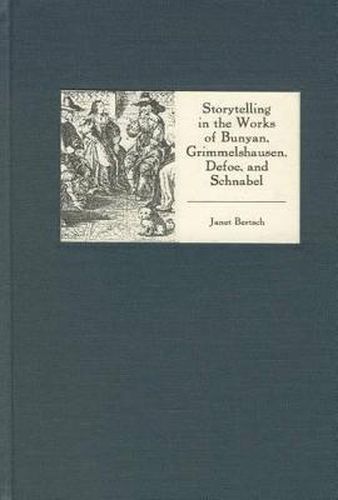Readings Newsletter
Become a Readings Member to make your shopping experience even easier.
Sign in or sign up for free!
You’re not far away from qualifying for FREE standard shipping within Australia
You’ve qualified for FREE standard shipping within Australia
The cart is loading…






The modern novel appeared during the period of secularization and intellectual change that took place between 1660 and 1740. This book examines John Bunyan’s Grace Abounding and The Pilgrim’s Progress, Johann Grimmelshausen’s Simplicissimus, Daniel Defoe’s Robinson Crusoe, and J. G. Schnabel’s Insel Felsenburg as prose works that reflect the stages in this transition. The protagonists in these works try to learn to use language in a pure, uncorrupted way. Their attitudes towards language are founded on their understanding of the Bible, and when they tell their life stories, they follow the structure of the Bible, because they accept it as the paradigmatic story. Thus the Bible becomes a tool to justify the value of telling any story. The authors try to give their own texts some of Scripture’s authority by imitating the biblical model, but this leads to problems with closure and other tensions. If Bunyan’s explicitly religious works affirm the value of individual narratives as part of a single, universal story, Grimmelshausen’s and Defoe’s protagonists effectively replace the sacred text with their own powerful, authoritative stories. J. G. Schnabel illustrates the extent of the secularization process in Insel Felsenburg when he defends the entertainment value of escapist fiction and uses the Bible as the fictional foundation of his utopian civilization: arguments about the moral value of narrative give way to the depiction of storytelling as an end in itself. But Bunyan, Grimmelshausen, Defoe, and Schnabel all use positive examples of the transfiguring effect of reading and telling stories, whether sacred or secular, to justify the value of their own works.Janet Bertsch teaches at Wolfson and Trinity College, Cambridge.
$9.00 standard shipping within Australia
FREE standard shipping within Australia for orders over $100.00
Express & International shipping calculated at checkout
The modern novel appeared during the period of secularization and intellectual change that took place between 1660 and 1740. This book examines John Bunyan’s Grace Abounding and The Pilgrim’s Progress, Johann Grimmelshausen’s Simplicissimus, Daniel Defoe’s Robinson Crusoe, and J. G. Schnabel’s Insel Felsenburg as prose works that reflect the stages in this transition. The protagonists in these works try to learn to use language in a pure, uncorrupted way. Their attitudes towards language are founded on their understanding of the Bible, and when they tell their life stories, they follow the structure of the Bible, because they accept it as the paradigmatic story. Thus the Bible becomes a tool to justify the value of telling any story. The authors try to give their own texts some of Scripture’s authority by imitating the biblical model, but this leads to problems with closure and other tensions. If Bunyan’s explicitly religious works affirm the value of individual narratives as part of a single, universal story, Grimmelshausen’s and Defoe’s protagonists effectively replace the sacred text with their own powerful, authoritative stories. J. G. Schnabel illustrates the extent of the secularization process in Insel Felsenburg when he defends the entertainment value of escapist fiction and uses the Bible as the fictional foundation of his utopian civilization: arguments about the moral value of narrative give way to the depiction of storytelling as an end in itself. But Bunyan, Grimmelshausen, Defoe, and Schnabel all use positive examples of the transfiguring effect of reading and telling stories, whether sacred or secular, to justify the value of their own works.Janet Bertsch teaches at Wolfson and Trinity College, Cambridge.